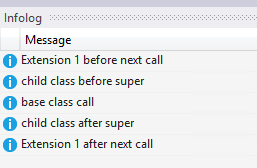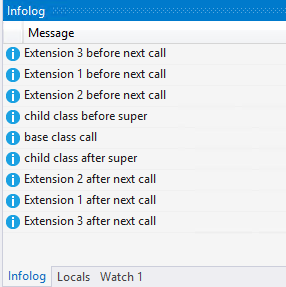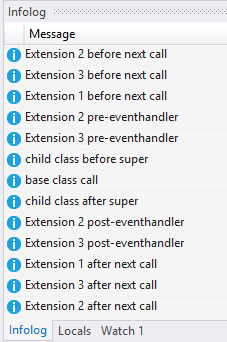Contract :
[
DataContractAttribute,
SysOperationContractProcessingAttribute(classStr(CITCustPaymImportUIBuilder))
]
class CITCustPaymImportContract implements SysOperationValidatable
{
CustAccount custAccount;
FilePath filePath;
FileUpload filepath1;
JournalId journalNum;
TransDate postingDate;
CustGroupId custGroup;
[
//DataMemberAttribute(identifierStr(Filepath)),
DataMemberAttribute('Filepath'),
SysOperationLabelAttribute('Upload document'),
SysOperationDisplayOrderAttribute('3'),
SysOperationHelpTextAttribute(literalStr("Assign file path"))
]
public FilePath parmFilePath(FilePath _filePath = filePath)
{
filePath = _filePath;
return filePath;
}
[
//DataMemberAttribute(identifierStr(CustAccount))
DataMemberAttribute('CustAccount'),
SysOperationLabelAttribute('Customer Account'),
SysOperationDisplayOrderAttribute('1'),
SysOperationHelpTextAttribute(literalStr("Customer Account no."))
]
public CustAccount parmCustAccount(CustAccount _custAccount = custAccount)
{
custAccount = _custAccount;
return custAccount;
}
[
//DataMemberAttribute(identifierStr(JournalNum)),
DataMemberAttribute('JournalNum'),
SysOperationControlVisibilityAttribute(false),
SysOperationDisplayOrderAttribute('4'),
SysOperationHelpTextAttribute(literalStr("JournalNum"))
]
public JournalId parmJournalNum( JournalId _journalNum = journalNum)
{
journalNum = _journalNum;
return journalNum;
}
[
//DataMemberAttribute(identifierStr(Postingdate)),
DataMemberAttribute('Postingdate'),
SysOperationLabelAttribute('Posting Date'),
SysOperationDisplayOrderAttribute('2'),
SysOperationHelpTextAttribute(literalStr("Posting Date"))
]
public TransDate parmPostingDate(TransDate _postingDate = postingDate)
{
postingDate = _postingDate;
return postingDate;
}
public boolean validate()
{
boolean isValid = true;
if (!custAccount)
{
isValid = checkFailed(strFmt("@SYS84753", custAccount));
}
/*if (!filePath)
{
isValid = checkFailed(strFmt("@SYS84753", filePath));
}*/
return isValid;
}
}
======================================================================
Controller:
class CITCustPaymImportController extends SysOperationServiceController
{
Common callerRecord;
void new()
{
super();
this.parmClassName(classStr(CITCustPaymImportService));
this.parmMethodName(methodStr(CITCustPaymImportService, process));
this.parmDialogCaption('Customer payments Import');
}
public static void main(Args _args)
{
CITCustPaymImportController controller;
controller = new CITCustPaymImportController();
controller.parmShowDialog(true);
CITCustPaymImportContract contract;
contract = controller.getDataContractObject();
if(_args.parm())
{
contract.parmJournalNum(_args.parm());
}
controller.startOperation();
}
public LabelType parmDialogCaption(LabelType _dialogCaption = "")
{
LabelType caption;
caption = "Customer payments Import";
return caption;
}
private void initFromCaller()
{
LedgerJournalTrans ledgerJournalTrans;
}
public boolean canGoBatch()
{
return false;
}
public Common parmCallerRecord(Common _callerRecord = callerRecord)
{
callerRecord = _callerRecord;
return callerRecord;
}
/// Refreshes the calling form data source.
protected void refreshCallerRecord()
{
FormDataSource callerDataSource;
if (this.parmCallerRecord() && this.parmCallerRecord().dataSource())
{
callerDataSource = this.parmCallerRecord().dataSource();
callerDataSource.research(true);
}
}
}
==================================================================
UI Builder :
class CITCustPaymImportUIBuilder extends SysOperationAutomaticUIBuilder
{
Dialog dlg;
DialogField dialogCustAcc;
DialogField dialogFilePath;
DialogField dialogPostingDate;
DialogField dialogJournalNum;
str FileUploadName = 'FileUpload';
private const str OkButtonName = 'Upload';
str fileUrl;
FileUploadBuild dialogFileUpload;
//dialogField dialogFileUpload;
CITCustPaymImportContract contract;
public void build()
{
DialogGroup dlgGrp;
contract = this.dataContractObject();
//get the current dialog
dlg = this.dialog();
dialogCustAcc = this.addDialogField(methodStr(CITCustPaymImportContract, parmCustAccount),contract);
dialogCustAcc.value('');
//dialogFilePath = this.addDialogField(methodStr(CITCustPaymImportContract, parmFilePath),contract);
dialogPostingDate = this.addDialogField(methodStr(CITCustPaymImportContract, parmPostingDate),contract);
dialogPostingDate.value(systemDateGet());
dialogJournalNum = this.addDialogField(methodStr(CITCustPaymImportContract, parmJournalNum),contract);
//make required modifications to the dialog
dlgGrp = dlg.addGroup('File Upload');
dlgGrp.columns(2);
FormBuildControl formBuildControl = dlg.formBuildDesign().control(dlgGrp.name());
dialogFileUpload = formBuildControl.addControlEx(classstr(FileUpload), FileUploadName);
dialogFileUpload.baseFileUploadStrategyClassName(classstr(FileUploadTemporaryStorageStrategy));
dialogFileUpload.fileNameLabel("@SYS308842");
dialogFileUpload.resetUserSetting();
dialogFileUpload.style(FileUploadStyle::MinimalWithFilename);
dialogFileUpload.fileTypesAccepted('.xlsx');
}
public void dialogPostRun(DialogRunbase _dialog)
{
//super(_dialog);
FileUpload fileUpload = this.getFormControl(_dialog, FileUploadName);
// fileUpload.notifyUploadCompleted += eventhandler(dlg.uploadCompleted);
//this.setDialogOkButtonEnabled(_dialog, false);
FileUploadTemporaryStorageResult fileUploadResult = fileUpload.getFileUploadResult() as FileUploadTemporaryStorageResult;
info(strfmt("-%1",fileUploadResult));
if (fileUploadResult != null && fileUploadResult.getUploadStatus())
{
fileUrl = fileUploadResult.getDownloadUrl();
info(strfmt("%1", fileUrl));
contract.parmFilePath(fileUrl);
}
}
protected FormControl getFormControl(DialogRunbase _dialog, str _controlName)
{
return _dialog.formRun().control(_dialog.formRun().controlId( _controlName));
}
private void setDialogOkButtonEnabled(DialogRunbase _dialog, boolean _isEnabled)
{
FormControl okButtonControl = this.getFormControl(_dialog, OkButtonName);
if (okButtonControl)
{
okButtonControl.enabled(_isEnabled);
}
}
public void run()
{
try
{
ttsbegin;
FileUpload fileUploadControl = this.getFormControl(dlg, FileUploadName);
FileUploadTemporaryStorageResult fileUploadResult = fileUploadControl.getFileUploadResult() as FileUploadTemporaryStorageResult;
info(strfmt("-%1",fileUploadResult));
if (fileUploadResult != null && fileUploadResult.getUploadStatus())
{
fileUrl = fileUploadResult.getDownloadUrl();
info(strfmt("%1", fileUrl));
}
ttscommit;
}
catch (Exception::Deadlock)
{
retry;
}
}
public void postBuild()
{
contract = this.dataContractObject();
dialogCustAcc = this.bindInfo().getDialogField(
this.dataContractObject(), methodStr(CITCustPaymImportContract, parmCustAccount));
dialogFilePath = this.bindInfo().getDialogField(
this.dataContractObject(), methodStr(CITCustPaymImportContract, parmFilePath));
dialogPostingDate = this.bindInfo().getDialogField(
this.dataContractObject(), methodStr(CITCustPaymImportContract, parmPostingDate));
dialogJournalNum = this.bindInfo().getDialogField(
this.dataContractObject(), methodStr(CITCustPaymImportContract, parmJournalNum));
}
private void custAccLookup(FormStringControl custAcclookup)
{
/*Query query = new Query();
QueryBuildDataSource qbds_CustTable;
QueryBuildRange qbrBlocked;
SysTableLookup sysTableLookup;
// Create an instance of SysTableLookup with the current calling form control.
sysTableLookup = SysTableLookup::newParameters(tableNum(CustTable), custAcclookup);
// Add fields to be shown in the lookup form.
sysTableLookup.addLookupfield(fieldNum(CustTable,AccountNum));
//sysTableLookup.addLookupfield(fieldNum(CustTable,Name));
sysTableLookup.addLookupMethod(tableMethodStr(CustTable,Name));
qbds_CustTable = query.addDataSource(tableNum(CustTable));
//this.query().dataSourceTable(tablenum(PurchTable)).addRange(fieldnum(PurchTable, PurchStatus)).value(strfmt('!%1,!%2',enum2str(PurchStatus::Canceled),enum2str(purchstatus::Invoiced)));
//qbds_CustTable.addRange(fieldNum(CustTable, Blocked)).value(enum2str(CustVendorBlocked::All),enum2str(CustVendorBlocked::Payment));
qbds_CustTable.addRange(fieldNum(CustTable, Blocked)).value(strfmt('!%1,!%2',enum2str(CustVendorBlocked::All),enum2str(CustVendorBlocked::Payment)));
sysTableLookup.parmQuery(query);
// Perform the lookup
sysTableLookup.performFormLookup();*/
CustTable::lookupCustomer(custAcclookup, curExt());
}
public void postRun()
{
super();
//Register overrides for form control events
dialogCustAcc.registerOverrideMethod(
methodstr(FormStringControl, lookup),
methodstr(CITCustPaymImportUIBuilder, custAccLookup),
this);
}
/// <summary>
///
/// </summary>
public void getFromDialog()
{
FileUpload fileUploadControl = dlg.formRun().control(dlg.formRun().controlId(FileUploadName));
FileUploadTemporaryStorageResult fileUploadResult = fileUploadControl.getFileUploadResult() as FileUploadTemporaryStorageResult;
if (fileUploadResult != null && fileUploadResult.getUploadStatus())
{
fileUrl = fileUploadResult.getFileId();
}
contract.parmFilePath(fileUrl);
super();
}
}
========================================================================
Service :
class CITCustPaymImportService extends SysOperationServiceBase
{
DMFExecutionId executionId;
DMFDefinitionGroup definitionGroup;
CustAccount custAccount;
FilePath filePath,filepath1;
JournalId journalNum;
TransDate postingDate;
Map uniqueKeyFieldListStagingMap,stagingTargetFieldListMap, autoGenStagingMap;
Map entityPermissionMap;
guid scopeIdentifier;
boolean processComposite;
Batch currentBatch;
FileUpload fileUpload;
map mapInv;
boolean isMapEnd;
public void process(CITCustPaymImportContract _contract)
{
filePath = _contract.parmFilePath();
custAccount = _contract.parmCustAccount();
journalNum = _contract.parmJournalNum();
postingDate = _contract.parmPostingDate();
try
{
This.processOperations(custAccount,filePath,journalNum,postingDate);
}
catch (Exception::Deadlock)
{
retry;
}
catch (Exception::UpdateConflict)
{
if (appl.ttsLevel() == 0)
{
/* if (xSession::currentRetryCount() >= #RetryNum)
{
throw Exception::UpdateConflictNotRecovered;
}
else
{
retry;
}*/
}
else
{
throw Exception::UpdateConflict;
}
}
catch (Exception::Error)
{
error(strFmt("Error occured"));
retry;
}
}
Void processOperations(CustAccount _custAccount,FilePath _filePath,JournalId _journalNum,TransDate _postingDate)
{
This. fileToDMStaging ();
This. ProcessStagingData(_custAccount,_journalNum,_postingDate);
This. stagingToTarget();
}
//This method execution will import the data from file to staging table
Void fileToDMStaging()
{
DMFDefinitionGroupExecution groupExecution;
DMFDefinitionGroupEntity dMFDefinitionGroupEntity;
definitionGroup = DMFDefinitionGroup::find(CustParameters::find().CITImportProject);
executionId = DMFUtil::generateExecutionId(CustParameters::find().CITImportProject);
Description description = strFmt('Execution - %1 for Definition Group - %2', executionId, CustParameters::find().CITImportProject);
DMFDefinitionGroupExecution::insertOrDisplay(definitionGroup, executionId, description, false);
select entity from dMFDefinitionGroupEntity where dMFDefinitionGroupEntity.DefinitionGroup == definitionGroup.DefinitionGroupName;
ttsbegin;
groupExecution = DMFDefinitionGroupExecution::find(definitionGroup.DefinitionGroupName,dMFDefinitionGroupEntity.Entity,executionId,true);
groupExecution.FilePath = /*"C4PCUATTF";*/filePath;
groupExecution.FilePath = groupExecution.applyTransforms(groupExecution.FilePath);
groupExecution.ExcelLookUp =
DMFDefinitionGroupEntity::insertExcelLookUpValue(
groupExecution.DefinitionGroup,
groupExecution.Entity,
groupExecution.FilePath,
groupExecution.Source);
groupExecution.update();
ttscommit;
DMFStagingWriterContract contract = new DMFStagingWriterContract();
DMFQuickImportExport::doPGImport(definitionGroup.DefinitionGroupName ,executionId);//Need to create extension of class DMFQuickImportExport to pass File path and assign it to the contract variable
}
public NoYes parmError(NoYes _errorStatus = NoYes::NO)
{
// errorStatus = _errorStatus;
return NoYes::NO;
}
//This method execution will process the staging data for particular execution Id
Void processStagingdata(CustAccount _custAccount,JournalId _journalId,TransDate _postingDate)
{
customerPaymentJournalLineStaging customerPaymentJournalLineStaging;
LedgerJournalTable ledgerjournaltable;
JournalTableData journalTableData;
ledgerjournaltable = LedgerJournalTable::find(journalNum,false);
Voucher voucher;
if(ledgerjournaltable)
{
voucher = JournalTableData::newTable(ledgerjournaltable).journalVoucherNum().getNew(true);
}
Update_recordSet customerPaymentJournalLineStaging
setting DefaultDimensionsForAccountDisplayValue= _custAccount,
AccountDisplayValue = _custAccount,
JournalBatchNumber = _journalId,
TransactionDate = _postingDate,
Voucher = voucher,
CurrencyCode = 'USD',
DocumentNumber = customerPaymentJournalLineStaging.MarkedInvoice
where customerPaymentJournalLineStaging.executionId == executionId;
select customerPaymentJournalLineStaging
where customerPaymentJournalLineStaging.executionId == executionId;
if (!this.isInvoiceExists(customerPaymentJournalLineStaging.MarkedInvoice))
{
This.assignInvoiceFromPO();
}
/* Else
{
// This.sumInvoiceId();
}*/
}
//Assign InvoiceId based on PO number provided in file
Boolean isInvoiceExists(InvoiceId _invoiceid)
{
boolean invexists;
CustInvoiceJour custInvoiceJour;
select RecId from custInvoiceJour
where custInvoiceJour.InvoiceId == _invoiceid;
if(custInvoiceJour)
invexists = true;
else
invexists = false;
return invexists;
}
Void assignInvoiceFromPO()
{
CustomerPaymentJournalLineStaging customerPaymentJournalLineStaging;
SalesTable SalesTable;
Amount invoiceAmount;
CustTransOpen CustTransOpen;
CustInvoiceJour custInvoiceJour;
CustTrans custTrans;
CustomerPaymentJournalLineStaging customerPaymentJournalLineStagingLoc,customerPaymentJournalLineStagingins;
MapEnumerator mapEnum;
While select sum(CreditAmount) from customerPaymentJournalLineStaging
group by markedInvoice
where customerPaymentJournalLineStaging.executionId == executionId
{
mapInv = new Map(Types::String, types::Real);
select SalesTable
where salesTable.PurchOrderFormNum==customerPaymentJournalLineStaging.MarkedInvoice;
if (SalesTable)
While select custInvoiceJour where custInvoiceJour.SalesId == SalesTable.SalesId
Join custTrans where custTrans.Invoice == custInvoiceJour.InvoiceId
&& custTrans.AccountNum == custInvoiceJour.InvoiceAccount
&& custTrans.TransDate == custInvoiceJour.InvoiceDate
&& custTrans.Voucher == custInvoiceJour.LedgerVoucher
join CustTransOpen where CustTransOpen.AccountNum == custTrans.AccountNum
&& CustTransOpen.RefRecId == custTrans.RecId
{
mapInv.insert(custInvoiceJour.InvoiceId,custTransOpen.amountMST);
}
mapEnum = new MapEnumerator(mapInv);
isMapEnd = false;
if(mapEnum.moveNext())
while select forupdate customerPaymentJournalLineStagingLoc
where customerPaymentJournalLineStagingloc.MarkedInvoice == customerPaymentJournalLineStaging.MarkedInvoice
&& customerPaymentJournalLineStagingloc.executionId == executionId
{
mapEnum = this.assignInvoice(customerPaymentJournalLineStagingloc,mapEnum);
if (isMapEnd)
break;
}
}
}
MapEnumerator assignInvoice(customerPaymentJournalLineStaging customerPaymentJournalLineStagingLoc,MapEnumerator mapenum)
{
Amount invoiceAmount;
customerPaymentJournalLineStaging customerPaymentJournalLineStagingins;
invoiceAmount = mapEnum.CurrentValue();
if (invoiceAmount >= (customerPaymentJournalLineStagingLoc.CreditAmount + customerPaymentJournalLineStagingLoc.CITDiscountAmount))
{
ttsbegin;
customerPaymentJournalLineStagingLoc.MarkedInvoice = mapEnum.CurrentKey();
customerPaymentJournalLineStagingLoc.update();
ttscommit;
/*if (!mapenum.moveNext())
{
isMapEnd = true;
return mapEnum;
}*/
if(customerPaymentJournalLineStagingloc.CreditAmount == invoiceAmount)
{
if (!mapenum.moveNext())
{
isMapEnd = true;
return mapEnum;
}
}
else
{
mapinv.insert(mapEnum.currentKey(),invoiceAmount-(customerPaymentJournalLineStagingloc.CreditAmount+customerPaymentJournalLineStagingLoc.CITDiscountAmount));
}
}
else
{
invoiceAmount = (customerPaymentJournalLineStagingLoc.CreditAmount+customerPaymentJournalLineStagingLoc.CITDiscountAmount)-invoiceAmount;
ttsbegin;
customerPaymentJournalLineStagingLoc.selectForUpdate(true);
customerPaymentJournalLineStagingLoc.MarkedInvoice = mapEnum.Currentkey();
customerPaymentJournalLineStagingLoc.CreditAmount = mapEnum.CurrentValue()-customerPaymentJournalLineStagingLoc.CITDiscountAmount;
customerPaymentJournalLineStagingLoc.update();
ttscommit;
customerPaymentJournalLineStagingins.data(customerPaymentJournalLineStagingloc);
customerPaymentJournalLineStagingins.LineNumber += 0.01;
customerPaymentJournalLineStagingins.CreditAmount = invoiceAmount;
customerPaymentJournalLineStagingins.RecId = 0;
customerPaymentJournalLineStagingins.CITDiscountAmount = 0;
customerPaymentJournalLineStagingins.MarkedInvoice = '';
customerPaymentJournalLineStagingins.insert();
if (!mapenum.moveNext())
{
isMapEnd = true;
return mapenum;
}
mapenum = this.assignInvoice(customerPaymentJournalLineStagingins,MapEnum);
}
return mapenum;
}
Void stagingToTarget()
{
DmfDefinitionGroupExecution dmfDefinitionGroupExecution;
dmfDefinitionGroupExecution=dmfDefinitionGroupExecution::find(CustParameters::find().CITImportProject,'Customer payment journal line',executionId);
if (dmfDefinitionGroupExecution.ExecutionId)
{
ttsbegin;
DMFDefinitionGroupExecution defGroupExec;
update_recordset defGroupExec
setting IsSelected = NoYes::yes,
ExecuteTargetStep = NoYes::Yes
where defGroupExec.ExecutionId == DMFDefinitionGroupExecution.ExecutionId;
ttscommit;
}
DMFentitywriter Dmfentitywriter = new DMFentitywriter();
Dmfentitywriter.parmEntityTableName('CustomerPaymentJournalLineStaging');
Dmfentitywriter.parmDMFExecution(DMFExecution::find(executionId));
Dmfentitywriter.parmDMFDefinitionGroupExecution(dmfDefinitionGroupExecution);
Dmfentitywriter.parmExecutionId(executionId);
Dmfentitywriter.run();
}
}
To get Batch button for sysoperation framework , we need to add before controller class
[SysOperationJournaledParametersAttribute(true)]












